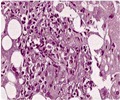Scientists at the Queensland Institute of Medical Research have developed a rheumatic fever vaccine. Human trials are to start next year, they told a conference in Brisbane today. The vaccine could save the lives of 400,000 children worldwide each year.
Rheumatic fever and rheumatic heart disease are both caused by an infection caused by streptococcus A bacteria, which also cause "strep throat".Australian Premier Kevin Rudd’s childhood bout of rheumatic fever sowed the seeds of a problem that required him to have a heart valve transplant 16 years ago.
Today the bacterial disease that causes rheumatic fever and rheumatic heart disease is largely confined in Australia to indigenous communities, which have the world’s highest known rates of the infection.
It is also rife in the developing world, where it thrives in conditions of poverty, overcrowding and poor hygiene. Michael Batzloff, laboratory head of the bacterial vaccines group for the institute said pre-clinical work had shown that animals given the vaccine reacted by generating antibodies against streptococcus infection.
When those antibodies were isolated from their blood and tested on other animals that had not been given the vaccine, those other animals were protected against the bacteria.
Further, the vaccine appeared to protect the animals for long periods by priming immune system "memory cells" to react against streptococcus after a long period. It also seemed to be effective against multiple streptococcus group A strains, including those circulating in Thailand and Fiji, raising hopes it could prove effective worldwide.
Advertisement
The human trials will initially involve a small number of healthy adults to check the vaccine is safe to inject into people. Later it will be tested on larger numbers, including people in remote Aboriginal communities, to test its ability to prevent cases of rheumatic fever and heart disease.
Advertisement
Jonathan Carapetis, director of the Menzies School of Health Research in Darwin, said the work was "incredibly exciting" as somewhere between 2 per cent and 3 per cent of all Aboriginal people in the Northern Territory had rheumatic heart disease - compared with about 0.01 per cent in the general population".
"No one in the world has figured out how to stop people getting these attacks (of rheumatic fever), which is why a vaccine is so important," Professor Carapetis said.
"People have to be realistic - we are still looking at a five to 10-year time frame (before the vaccine is available). But we are closer than we have ever been."
Source-Medindia
GPL/L













